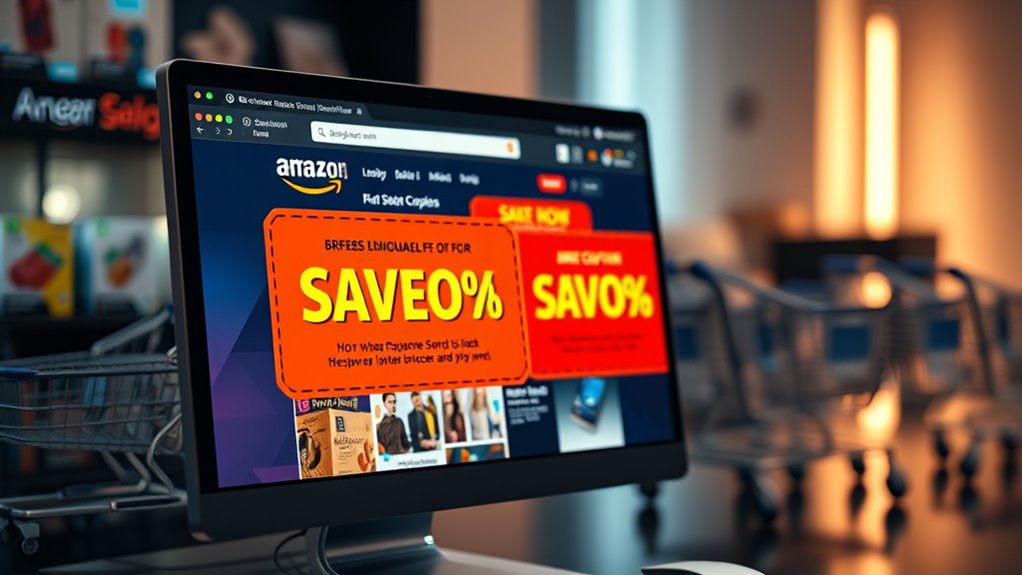Coupon retargeting works by using cookies to anonymously track your activity when you view deals or products. These small data files help platforms like Amazon recognize your interest without revealing personal details. Later, they serve targeted ads, gently nudging you to return and complete your purchase, especially if you left items in your cart. If you keep exploring, you’ll discover how this smart process boosts your chances of snagging great deals while respecting your privacy.
Key Takeaways
- Coupon retargeting uses cookies to anonymously track your browsing, allowing platforms like Amazon to serve you relevant ads later.
- It helps Amazon remind you of products or deals you viewed but didn’t purchase, encouraging return visits.
- This method increases conversion chances by focusing ads on users already interested in specific offers or products.
- Cookies do not reveal personal data; they simply record engagement to optimize advertising efforts ethically.
- By nudging you with tailored offers, Amazon aims to recover potential sales and improve overall shopping experience.

Coupon retargeting is a powerful marketing strategy that helps you reconnect with visitors who showed interest but didn’t convert. When you browse online and see a coupon or deal from a retailer like Amazon, behind the scenes, a small piece of code called a pixel is working silently. This pixel uses cookie-based technology to track your activity anonymously across different websites. When you load the coupon, it drops an unobtrusive cookie on your browser, which signals to retargeting platforms that you’ve shown interest. Later, as you continue browsing online, these platforms can serve you targeted ads or coupons related to your initial interest, keeping the brand or offer top of mind. Cookies are stored locally in your browser, enabling seamless tracking without affecting your device’s performance. This retargeting process relies entirely on cookies, which are tiny data files stored in your browser. These cookies don’t identify you personally; they only record your engagement with the coupon or website. This way, the technology respects your privacy while still allowing advertisers to focus their efforts on users who have already demonstrated some level of interest. Platforms like Facebook Pixels, Google Ads, and Adroll facilitate this process, enabling businesses to reach you through various ad formats—display ads, social media posts, emails, or even SMS messages. The goal is simple: remind you of the products or deals you viewed but didn’t purchase, nudging you toward completing the transaction.
Coupon retargeting uses cookies and pixels to reconnect with interested, non-converting visitors through targeted ads and offers.
The primary purpose of coupon retargeting is to recover potential revenue that might otherwise be lost. Many shoppers add items to their carts but leave without buying, often because they need a gentle reminder or an extra incentive. Retargeting keeps the brand fresh in your mind, encouraging you to return and finalize your purchase. It’s especially effective in e-commerce, where abandoned carts account for billions in lost sales annually. By focusing advertising spend on users who have already shown interest, retargeting increases the likelihood of conversion, boosting overall ROI. It’s a strategic way to nurture leads over multiple online touchpoints, gradually guiding users toward making a decision.
Marketers find coupon retargeting highly effective because it improves conversion rates and maximizes the return on advertising spend. Since the ads are targeted precisely at users with demonstrated purchase intent, they tend to be more relevant and engaging. This reduces wasted impressions and helps recover sales from abandoned carts or bounced traffic. The approach is also privacy-conscious; it relies on anonymous cookies that don’t reveal personal information. Users can opt out by clearing cookies or adjusting browser privacy settings, ensuring that the process stays transparent and respectful of individual privacy. In essence, coupon retargeting acts as a gentle follow-up, turning interest into action without intruding on your browsing experience.
Frequently Asked Questions
How Does Coupon Retargeting Differ From Regular Retargeting Ads?
You might wonder how coupon retargeting differs from regular retargeting ads. With coupon retargeting, you see ads that include discounts or limited-time offers, aiming to encourage you to complete a purchase. Regular retargeting, on the other hand, mainly reminds you of products without discounts. The key difference is that coupon retargeting uses incentives to boost your motivation and increase the chances of conversion.
Can Coupon Retargeting Work Across Multiple Devices?
Yes, coupon retargeting can work across multiple devices. You’re tracked through technologies like login info or device behavior, allowing marketers to link your smartphones, tablets, and desktops. This means you’ll get personalized offers and coupons no matter what device you’re using. When done right, it creates a seamless experience, making it easier for you to find relevant discounts and increases the chances you’ll redeem those offers, boosting your overall shopping satisfaction.
What Are the Privacy Implications of Coupon Retargeting?
You might wonder about the privacy implications of retargeting. When companies track your browsing and shopping behaviors, they gather data that can reveal personal interests and habits. This raises concerns about consent, data security, and transparency. While anonymization helps safeguard your identity, there’s still a risk of data misuse or breaches. Regulations like GDPR and CCPA aim to ensure companies respect your privacy, but you should stay informed about how your data is collected and used.
How Effective Is Coupon Retargeting Compared to Traditional Discounts?
You may find coupon retargeting more effective than traditional discounts because it offers personalized, timely offers based on your behavior. This targeted approach reduces cart abandonment by 30% and encourages repeat visits. Unlike broad discounts, retargeting uses data to deliver relevant deals, boosting your chances of completing a purchase. This precision means retailers spend less while increasing your shopping experience, making retargeted coupons a smarter, more efficient strategy for everyone.
Which Industries Benefit Most From Coupon Retargeting Strategies?
Think of industries like retail, consumer goods, electronics, and fashion as the stars of the coupon retargeting show. You’ll find they benefit most because they have higher redemption rates—8-15% for everyday goods and 4-7% for electronics and fashion. These sectors thrive on targeted digital coupons, especially during seasonal sales or major shopping events, making your retargeting efforts more effective and driving increased consumer engagement.
Conclusion
So, next time Amazon nudges you with a coupon, remember it’s all part of their clever game to reel you in, much like a fisherman with his shiny lure. They use retargeting to remind you of what you almost bought, making sure you don’t forget. It’s like having your own personal shopper, but with a dash of digital wizardry. Embrace it—after all, in this digital age, a well-placed coupon is your secret weapon, just like the trusty pocket watch of yesteryear.









